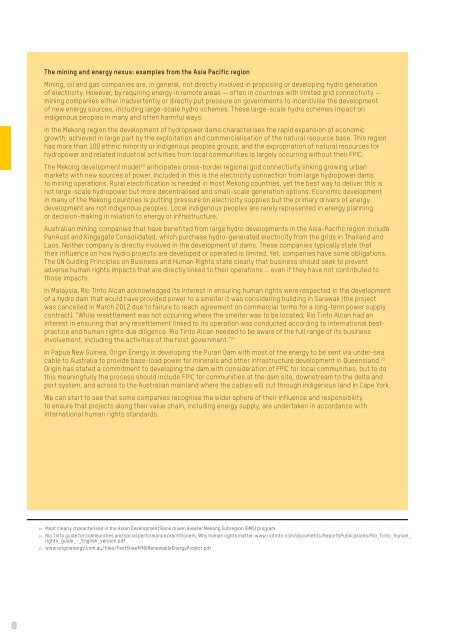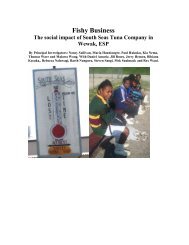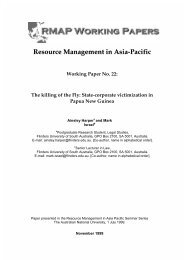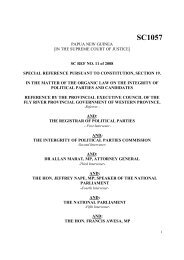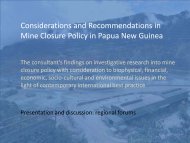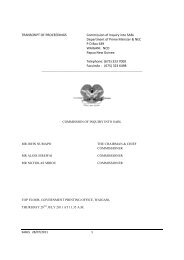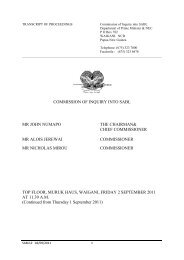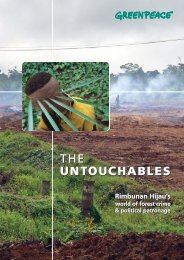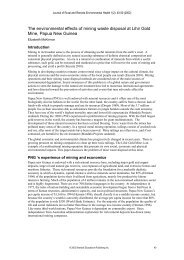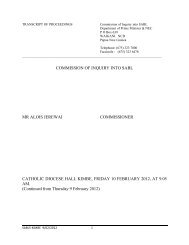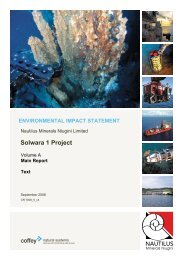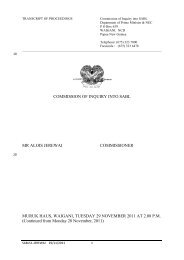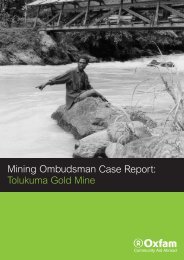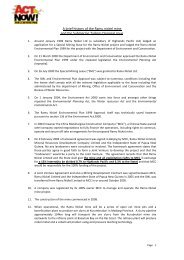Oxfam Australia and CAER: The right to decide
Oxfam Australia and CAER: The right to decide
Oxfam Australia and CAER: The right to decide
You also want an ePaper? Increase the reach of your titles
YUMPU automatically turns print PDFs into web optimized ePapers that Google loves.
<strong>The</strong> mining <strong>and</strong> energy nexus: examples from the Asia Pacific region<br />
Mining, oil <strong>and</strong> gas companies are, in general, not directly involved in proposing or developing hydro generation<br />
of electricity. However, by requiring energy in remote areas — often in countries with limited grid connectivity —<br />
mining companies either inadvertently or directly put pressure on governments <strong>to</strong> incentivise the development<br />
of new energy sources, including large-scale hydro schemes. <strong>The</strong>se large-scale hydro schemes impact on<br />
indigenous peoples in many <strong>and</strong> often harmful ways.<br />
In the Mekong region the development of hydropower dams characterises the rapid expansion of economic<br />
growth; achieved in large part by the exploitation <strong>and</strong> commercialisation of the natural resource base. This region<br />
has more than 100 ethnic minority or indigenous peoples groups, <strong>and</strong> the expropriation of natural resources for<br />
hydropower <strong>and</strong> related industrial activities from local communities is largely occurring without their FPIC.<br />
<strong>The</strong> Mekong development model 23 anticipates cross-border regional grid connectivity linking growing urban<br />
markets with new sources of power. Included in this is the electricity connection from large hydropower dams<br />
<strong>to</strong> mining operations. Rural electrification is needed in most Mekong countries, yet the best way <strong>to</strong> deliver this is<br />
not large-scale hydropower but more decentralised <strong>and</strong> small-scale generation options. Economic development<br />
in many of the Mekong countries is putting pressure on electricity supplies but the primary drivers of energy<br />
development are not indigenous peoples. Local indigenous peoples are rarely represented in energy planning<br />
or decision-making in relation <strong>to</strong> energy or infrastructure.<br />
<strong>Australia</strong>n mining companies that have benefited from large hydro developments in the Asia-Pacific region include<br />
PanAust <strong>and</strong> Kingsgate Consolidated, which purchase hydro-generated electricity from the grids in Thail<strong>and</strong> <strong>and</strong><br />
Laos. Neither company is directly involved in the development of dams. <strong>The</strong>se companies typically state that<br />
their influence on how hydro projects are developed or operated is limited. Yet, companies have some obligations.<br />
<strong>The</strong> UN Guiding Principles on Business <strong>and</strong> Human Rights state clearly that business should seek <strong>to</strong> prevent<br />
adverse human <strong>right</strong>s impacts that are directly linked <strong>to</strong> their operations … even if they have not contributed <strong>to</strong><br />
those impacts.<br />
In Malaysia, Rio Tin<strong>to</strong> Alcan acknowledged its interest in ensuring human <strong>right</strong>s were respected in the development<br />
of a hydro dam that would have provided power <strong>to</strong> a smelter it was considering building in Sarawak (the project<br />
was cancelled in March 2012 due <strong>to</strong> failure <strong>to</strong> reach agreement on commercial terms for a long-term power supply<br />
contract). “While resettlement was not occurring where the smelter was <strong>to</strong> be located, Rio Tin<strong>to</strong> Alcan had an<br />
interest in ensuring that any resettlement linked <strong>to</strong> its operation was conducted according <strong>to</strong> international bestpractice<br />
<strong>and</strong> human <strong>right</strong>s due diligence. Rio Tin<strong>to</strong> Alcan needed <strong>to</strong> be aware of the full range of its business<br />
involvement, including the activities of the host government.” 24<br />
In Papua New Guinea, Origin Energy is developing the Purari Dam with most of the energy <strong>to</strong> be sent via under-sea<br />
cable <strong>to</strong> <strong>Australia</strong> <strong>to</strong> provide base-load power for minerals <strong>and</strong> other infrastructure development in Queensl<strong>and</strong>. 25<br />
Origin has stated a commitment <strong>to</strong> developing the dam with consideration of FPIC for local communities, but <strong>to</strong> do<br />
this meaningfully the process should include FPIC for communities at the dam site, downstream <strong>to</strong> the delta <strong>and</strong><br />
port system, <strong>and</strong> across <strong>to</strong> the <strong>Australia</strong>n mainl<strong>and</strong> where the cables will cut through indigenous l<strong>and</strong> in Cape York.<br />
We can start <strong>to</strong> see that some companies recognise the wider sphere of their influence <strong>and</strong> responsibility<br />
<strong>to</strong> ensure that projects along their value chain, including energy supply, are undertaken in accordance with<br />
international human <strong>right</strong>s st<strong>and</strong>ards.<br />
23. Most clearly characterised in the Asian Development Bank driven Greater Mekong Subregion (GMS) program.<br />
24. Rio Tin<strong>to</strong> guide for communities <strong>and</strong> social performance practitioners, Why human <strong>right</strong>s matter: www.riotin<strong>to</strong>.com/documents/ReportsPublications/Rio_Tin<strong>to</strong>_human_<br />
<strong>right</strong>s_guide_-_English_version.pdf<br />
25. www.originenergy.com.au/files/FactSheetPNGRenewableEnergyProject.pdf<br />
8


